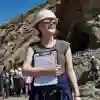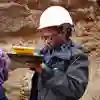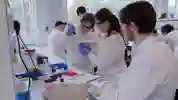



Designed for geoscientists with a passion to drive an environmentally-sensitive future, this degree will prepare you for a career in the wide range of Earth and Environmental Science industries.
You’ll study topics from climate change to clean water, geohazards to green energy at a university that is a champion of sustainability.
And at Hull, you also get a world of opportunities to learn first-hand on field trips. So by the time you graduate, you’ll be ready to tackle Earth’s biggest challenges.
About this course
Understanding how the Earth works, the forces that shape it and how we can use its resources in a sustainable way is crucial to the future of our planet.
From day one, you’ll be trained to become a sustainably-minded geoscientist. Using your passion to drive an environmentally-sensitive world, we'll empower you to join us in helping to build a fairer, sustainable, carbon neutral future.
Not only that – you'll develop skills in observation and analysis in order to understand Earth and environmental processes across a range of timescales, both locally and globally.
Learning by doing is an important part of the course, whether you’re getting your hands dirty in the labs or treading the soil in Spain. And the best bit is, all your core field trip costs are included in your tuition fees.
Tackle some of the planet's greatest challenges
Module options
Each year, you’ll study modules worth a certain number of credits, and you need 120 credits per year. Most modules are 20 credits – so you’ll study six modules each year. Some longer modules, such as a dissertation, are worth more. In these cases, you’ll study fewer modules - but the number of credits will always add up to 120. Some modules are compulsory, some are optional, so you can build a course that’s right for you.
Filters
Planet Earth
Develop an understanding of the Earth as a planet – the atmosphere and oceans working together to create global patterns of climate and ocean circulation; plate tectonics and the movement of continents; living systems evolving over time and forming the global biosphere; and the surface processes of accumulation and erosion shaping the landscapes around us. The module will help you to see how ideas in physical geography can be used to understand patterns observed in the natural environment at a global and continental scale.
compulsory
20 credits
Exploring Worlds Around Us
You’ll find out about many different ways of studying the world around us by exploring a specific field trip location.
compulsory
20 credits
Rocks, Minerals and Fossils
Learn how Earth works by getting hands on with rocks, minerals and fossils in the lab and in the great outdoors in spectacular geological locations. By the end of the module you will be able to explain the origins of rocks, minerals and fossils and interpret the various geological environments that they represent, on ancient Earth’s surface and in its interior.
compulsory
20 credits
Interpreting Environments
This module introduces you to some key tools we use to interpret the environments around us, such as computer mapping and data analysis.
compulsory
20 credits
Environmental Problems and Solutions
Discover the fundamental principles of environmental systems and the interconnectedness of humankind with the environment.
compulsory
20 credits
Earth in 3D
How does Earth actually work under your feet? Find out what rocks do inside the Earth’s, and why that is important for a whole range of industries. Learn how to analyse and interpret subsurface features in order to understand how Earth works in 3D.
compulsory
20 credits
Geoscience Field Skills
This module will enable you to use learning by doing and research-based learning in the laboratory and in a spectacular geological field location in order to develop your skills for independent work in your dissertations. You will develop understanding of how to analyse a wide range of unfamiliar rocks and features and gain confidence in deploying your own skills in an area of major geological activity and significance.
compulsory
20 credits
Geographical Information Systems
Develop your understanding of the principles and processes behind GIS, the nature and use of spatial data and the application of GIS on this practical module.
compulsory
20 credits
Field Study (Environmental Science)
Seeing features from this and previous modules come to life. You will learn how to test theories of landform development yourself with new data collection techniques you will explore in groups in a setting carefully selected for its physical geographic features.
compulsory
20 credits
Our facilities


Watchlist
Dr Anna Bird
Course overview
2 mins
Almeira field trip
Course Highlight
10 mins
Teaching Facilities
University life
2 mins
Featured academics
Our staff are at the forefront of research with connections to policy makers and industries that can drive real change.
They’re out studying the latest solutions to climate change, geological hazards, mass extinctions and volcanism. And they bring this knowledge to you through research-led teaching.

Dr Anna Bird
Lecturer in Geology
Anna is a lecturer in metamorphic geology who also works on Quaternary sediments.

Dr Rebecca Williams
Reader in Volcanology
Rebecca is a Reader in Volcanology who takes an interdisciplinary approach to volcano research. Rebecca is also an expert on equality, diversity and inclusivity in curriculum design, with a particular focus on the Earth Sciences across the sector.
Entry Requirements
What do I need?
This course is currently available through Clearing, which means our entry requirements are a bit different to what they would normally be.
At Hull, you're a name not a number. During Clearing, we look at all of your qualifications and experience, not just your academic grades. We may be able to offer you a place whatever your situation. Get started by completing our eligibility checker, and find out immediately if you could study at the University of Hull.
Have questions? Our admissions team will be happy to help.
Fees & Funding
How much is it?

Future prospects
Once you graduate, you’ll be qualified to pursue geological careers in environmental consulting, remediation, renewable energies, exploration geology, surveying and engineering, with employers including the likes of the Environment Agency, environment consultancies, local councils or wildlife trusts.
Or you can put the transferable practical, research and numerical skills you’ll develop to good use in a wholly different way: teaching, finance, data analysis, and more.
The programme is also an ideal platform for further study.
Become part of the next generation of futuremakers
Like what you've seen? Then it's time to apply.
The standard way is to apply through UCAS. This will give you the chance to showcase your skills qualities and passion for the subject, as well as providing us with your academic qualifications.
Not ready to apply yet?
Visit our next Open Day, and see all that the University of Hull has to offer. Talk to our lecturers about your subject, find out what university is really like from our current students, and take a tour of our beautiful campus and amazing facilities.
You may also be interested in...
Ranked joint 5th out of 27 institutions for Graduate Prospects - Outcomes. Complete University Guide 2025.
94% employability (Geography and Environment) UK domicile full-time first degree leavers; Higher Education Graduate Outcomes statistics, for the academic year 2022/23, published by the Higher Education Statistics Agency June 2025.
All modules on this course page are subject to availability and this list may change at any time.